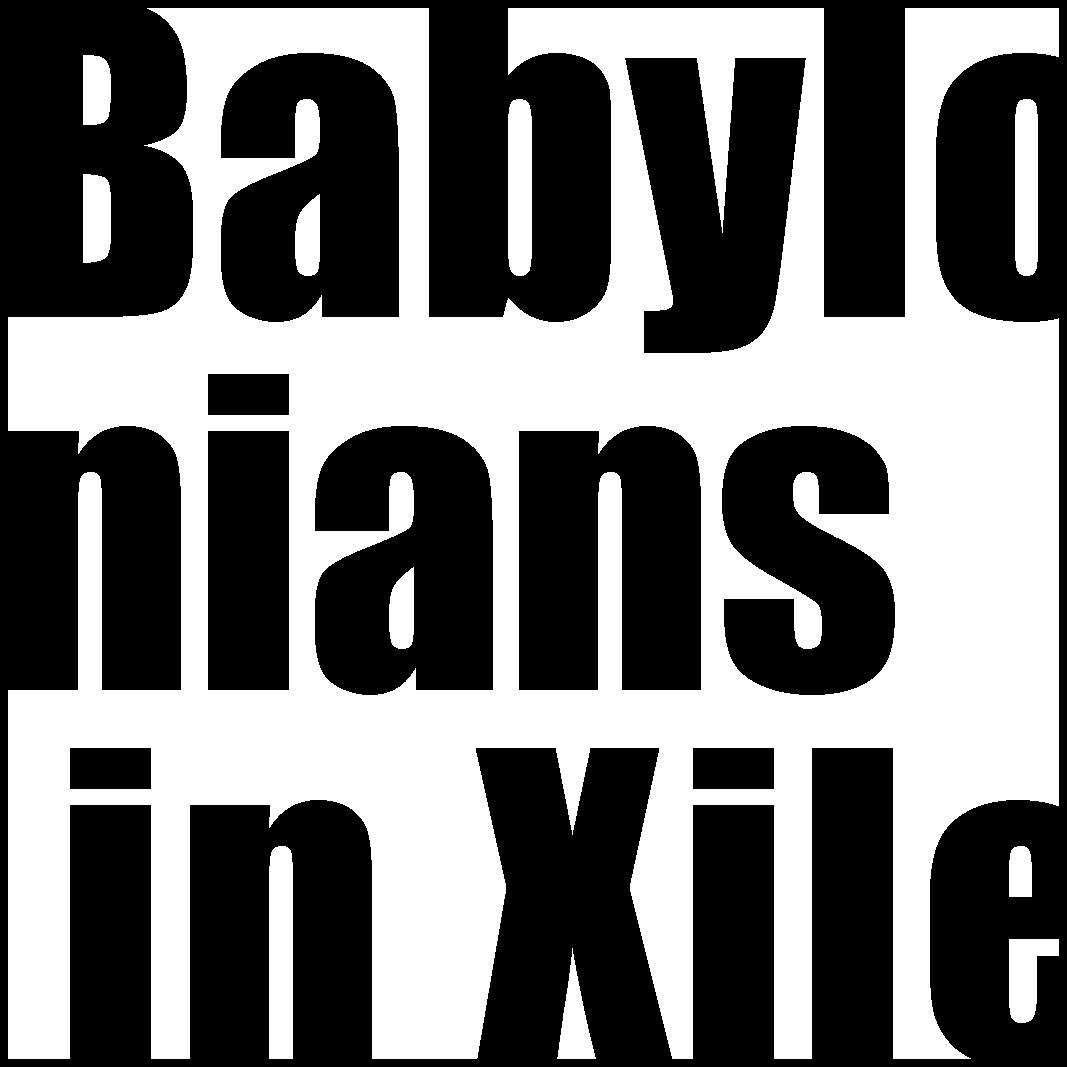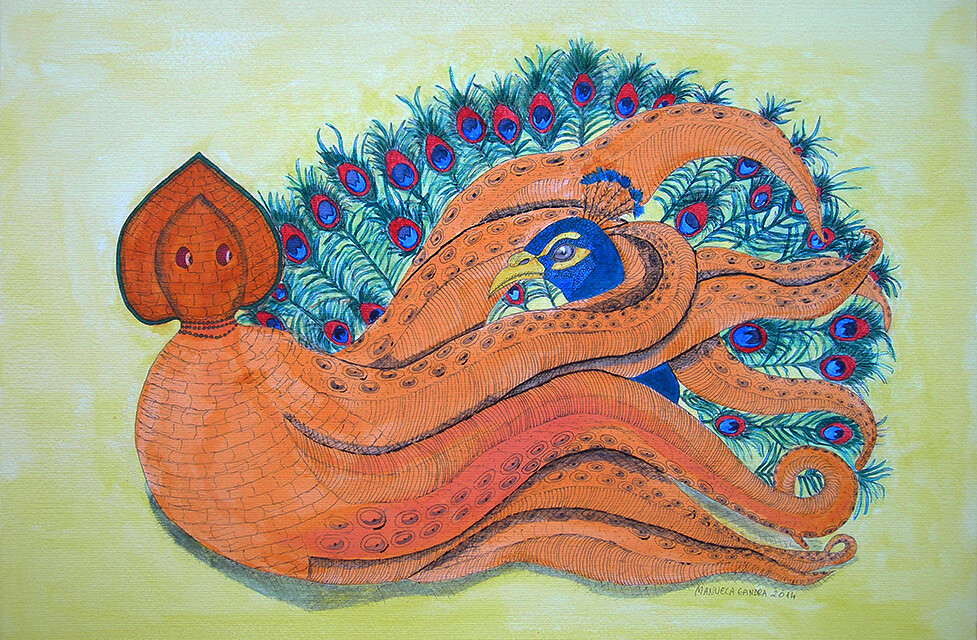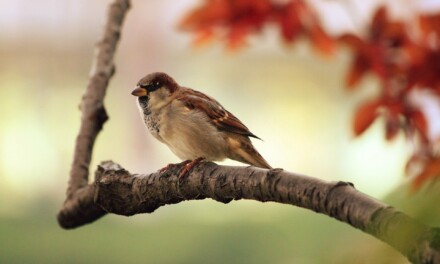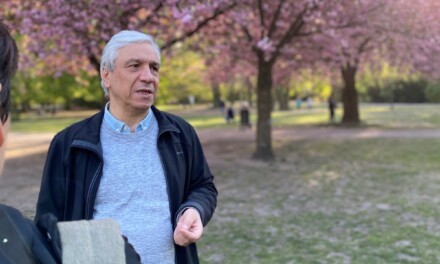1
Back then, people wouldn’t even seek relief when they felt melancholic. She too, would find herself back at ease looking over the city from the balcony, playing with the lights and sounds offered in the scenery below, Bosporus and the slums climbing up to hill skirts diving into the Marmora, on which the warm lights of mansions dance. Mesmerized, she’d drift off and watch flashes of Constantinople myths running in her mind, then, her eye would catch the sight of that anonymous sweetheart of everyone, and she’d fall back in love with the scary city, for her sake. The warm she felt after this sequence of thoughts always made her hold on tighter to the wooden handrails, and the calm of the trees below calmed her, with the secured choice to jump if she were to ever feel like it. Then, she’d notice the water splitting behind the boats traveling in dark. Sometimes, in that arrow-like lines she believed she could see the pieces of her shattered and scattered destiny. The more she looked at random silhouettes the more shade would fall on them, and she’d shiver with this insatiable want to get down to the shore and wash her feet and face with the salty water. Then, a sound from the inside would pull her back to reality and she’d step away from the handrails and get inside, dizzy from dreaming.
It was a similar night, she was at the balcony and in love with the Bosporus, despite the chill winds in her chemise. Practically all worries could be soothed between these two pieces of land, why would hers be any different? The city was calling for her. After her birth, the umbilical cord tying her to her mother couldn’t be cut, so a dagger was brought in from there, the city. Ever since that dagger touched the cord, the dream of Constantinople had been calling out her name along the Danube.
Tonight, she was thinking about all the times she was mesmerized, without ever needing a man by her side, and the breeze was getting colder. Relaxed in the sound of the waves, she suddenly knew that it was time. It was time for that poem, but for that she had to part with her body. She gave up her balcony too.
No hand can touch death, the body is cold and it stinks
Of everything marine
This death is by hand with a dagger,
One that sneaked in from behind
While the soul is sent off to reappear
It’ll travel beyond cities, reeking salt
And the hand is now desperate, it both gave
And took away a life
A moment of existence beyond death
No hand should touch death, conscience comes in after
And clears the heart
This death however, was by a hand, it wrapped your hair
Around its knuckles and slit your throat
Now you’re off to get washed in rivers,
And the heart is emptied out, it both distilled
And streamed your blood
A moment of perishing
2
This is the legend of the oldest poet of the world. He has this one poem in mind, yet he can’t put it in words. This poet is a very old, blind and wise man with many lives. Many great families and emperors thanked him over the years, and he read his poems in many of the great palaces. He was granted plenty of gems, women and gold. But that one poem, not a line of it was ever heard from him, anywhere. One day, Gok Han asks him why he keeps that one poem to himself. The poet says that he’d be pleased to address it to the right eye. The Han lets the poet be.
The poet then goes on a long journey, knowing that it’ll be his last. He reassures himself that he’s okay with the idea of never reading that poem to anyone. Yet his heart doesn’t agree. Around today’s Iran, his group stops over at a lodge. After midnight, while everyone else dozes off from wine and women, our blind poet takes a hike in the night’s pleasant weather. He feels as if a staff in him guiding the way, and he keeps on walking, without fearing getting lost. The staff would take him back to the lodge like it took him out of there anyway. The poet walks and walks, in the path invisible to him, following the sound of his skin and steps. His feet get stuck in this soft, gloopy spot, and he quickly steps back, and the cold air swirls around him. A second later, he senses a fire rising before him, its heat cuddles him. Suddenly a whoosh, as if a creature opened its enormous wings, the poet is baffled by its supremeness, so he knows nothing but to get down on his knees, and yells at the darkness: “Grant your name to me.”
The darkness breezes all around him, and the poet can’t believe his ears when he hears the giant mouth speak: “I’m the Phoenix. I called you to hear the poem locked up in you.”
The poet puts his face on the ground, laughs and cries with volcanoes erupting inside his brain, then he raises his head high and collects the tears running down the cracks of his face, and offers it to the Phoenix. “I have one wish,” he says. “Decapitate me after the last line, let my corpse see your beauty.”
The Phoenix then gracefully nods and agrees to the poet’s final wish. And so the poet begins reading…
3
There she is, letting the geese wash in the shimmering Danube, having lunch with some cheese and bread, now she’s fallen asleep under the sun, dreaming about that sweet boat she’ll never get on.
She woke up. This glimpse into her happy childhood suddenly disappeared and she found herself looking at a collage of everything she ever wanted but never got. She was dreaming in her dream how she’d make a feisty, merciless captain with her giant shield and shiny sword. In fact, her hands and feet were tied, there were no shields or swords around, just toothless slaves. She was on a boat, though.
She didn’t have breasts yet, nor any body hair, hence she was sold for a good sum. Before the purchase was complete, they opened her mouth and checked her nice, white teeth. They didn’t do much else, she was always fed and never abused.
Afterwards she spent a lot of time in small storage rooms. By the time she grew nipples and bled she was in a world where people called Galata. She was gazing over the lovely ships afar, and thinking of ways to get on them and escape when she saw him. His glance resembled her father’s when he let her handle the geese. He grabbed her by the ankle, and poured bags of gold in her palms, coins overflew, to which she responded by fainting. She still remembered being carried into the palace through the Felicity Gate by her founder, Alaca Agha.
She lived a quiet life for years, away from others’ attention and conversation, without a past and a decent room. She mastered three languages, art of minimal lettering, painting, music, internalizing the concept of war, embroidery and making a nice cup of coffee, bookkeeping and showing both flirty and elegant with her words and attitude, matching colors and lovers, tales and myths, and finally she conquered herself. In those years she learned the cuisine, the bazaar from the merchants went when they left the harem in their chariots, her future from the fortune tellers, lullabies and dancing from odalisques, tradition and solemnity from the more experienced and proud stances, gold, diamond, rings and necklaces from the favorites. They taught her how to pick the good ones out of the items brought to the harem, and how to protect herself, though she still hadn’t been in bed with someone, she was told about the lust and the hands that would spread her legs. Eunuchs were breaking the candle sticks into pieces as soon as they arrived, soap bars too, and nothing similar to eggplant, cucumber of carrots could be smuggled out of the kitchen, ever. She knew what use these things would serve, but she chose not to ponder on that. She didn’t try to catch a look from the Sultan’s sons as they walked by, nor did she craved to be called to pass through that famous corridor. She took the tambura and the lute, added their sounds to the North African music, experimented on her own. One day the Agha that brought her in stopped showing up, and he was presumed dead, yet she couldn’t even cry for him. She was no longer a child; she had no emotions either. She believed she lost the last of those in that nap she took by the Danube. She wasn’t missing her parents; she had forgot about them. She didn’t even remember her first name. She had no other merit but to be Dilashub, and she was good at it too, especially at jewelling hair combs. Dilashub also enjoyed making up myths and telling them to girls gathered around a candlelight in the pantry. A year later, she knew she was on a path towards poetry.
She began writing vigorously. Her poems sometimes ended up in the hands of favorites, or the head odalisque, and Dilashub was called to read her poems for a small crowd at nights. After one of these nights, she witnessed an incident that changed both the color of her poems and her destiny…
Dilashub had sneaked outside before bed for a walk, listening her steps echo on the old stones. She saw the incontestably beautiful, the favorite of the favorites, wife and the most precious odalisque of the sultan lying on the road to the chariot gate of the harem, with a dagger in her ribs, in a pool of her own blood. Stepped into this horrid scene, she raised hell and in minutes every doctor of the harem were gathered her side. Helpers, eunuchs, odalisques with fear flaming in their eyes watched as Dilashub put her lips around the fresh wound. She was acting on an urge, and she knew one sole prayer from this ancient legend that her mother used to tell her about. She hadn’t recited it while she was being sold like a property, but by the sight of blood she began saying this prayer over and over again, soothing herself and everyone around somehow. The bleeding stopped, the crowd and the doctors let their breaths. The sultana survived the attack.
When the chief-footman came in the morning to call Dilashub to see the sultan, she couldn’t even move at first. Then, she followed his steps and stood calm before the emperor. She kissed his skirts and looked down. The man held her chin and raised her head, asked her to repeat the prayer.
“But, there’s no need for that now. No one is bleeding, I… I can’t.”
The sultan didn’t thunder, let alone say a word. She was excused, and when she returned her bed was gone. She now had a room in the chamber of the favorites, with pearl engraved chests in it. She was undoubtedly happy. Others kept asking what happened that morning when she saw the sultan, and she kept telling them exactly what happened. They never believed a bit.
She got carried away by all these things she won without touching a soul. Apparently saving the sultana wasn’t the only merit of hers that got her into the sultan’s eye. That prayer must have had some sort of force in all this.
She was on a new path, and her drive was the poems she couldn’t write. She knew she had to amp up that magic, but with what? Another word, a suffix, a specific rhythm, something more… Something different called for Dilashub, such that it couldn’t be found in any dewan, nor in the deep-seated structures of masters. So she went out, from the chariot gate and followed some fortune tellers, she heard names and got references, ended up finding the best of the best. She couldn’t ask them to come to the palace, she had to go and experience whatever it was to be experiences in person. The trip was going to take quite a while. She went straight to the top to ask for a leave, the sultan.
“Where will you go and what for?” he asked.
“I don’t know where, but I’ll be back with more prayers for me, more prosperous years of reign for you, and even more glorious victories for our empire,” she answered. Her only desire, however, was to find the potential of her magic.
“Then go,” the sultan said. “You’ll be taken care of on the way.”
Her trip lasted two hundred and sixty-three days exactly. She found the woman-like being in her cave.
4
I hide in creeks, and start the day with your name
My sunshine
I stand for prayer, and lay my face on the ground
Thinking of you
I gave up wanting you, and settled for our soldiers, HUH!
Embers and bitter coffee, my past is yours truly
The last count of my prayer beads
Is still for you
I no longer dream about you, but rather
Listen to others’ moan under you, OH!
Flowers and silky thorns, my morals are yours truly
I still see you when the curtain falls
But, truly, I no longer aspire to be anything, my mother SIGHS!
Beaks and cheery tweets, my manhood cut, I drip into the creeks, I feed on your blood
My past
I remember.
5
The Phoenix gracefully nodded and agreed to the poet’s final wish. And so, the poet began reading…
I put together a tongue, added some from the Sumerian in it.
And some Phrygian, Roman, Greek and some Byzantine too.
My quest was to tell;
Tell how much blood was shed, now dried
How no one looked while a new layer of fresh blood poured…
The only free being by the eyes of Gods, is the fertile woman
I reached into the void found a dying soul there,
They were sent there by the wrath of Achilles, Zeus, Magna Mater and Hera
I was reborn, didn’t think I was any less than before
I created a soul, put some from the people of Hattusa in it.
And some from the Gordion, Samarkand, and Ulaanbaatar too.
I began telling the suffering
And how no one cared when it continued
The woman who let out the sun from her womb is free, only and only by the eyes of Gods
I put new vessel out there, there seemed to be no one around
But her.
I coiled up in her, by the wrath of both Tengri and Allah
I wasn’t any less human than before.
I did find a new religion, put some from Constantinople in it.
Some from Galata, Topkapı and Azapkapı.
I kept telling how many heads it all cost
And how new mouths were fed only to die.
Free.
Free like the woman feeding the moon and the sun with her two breasts
And the Gods watching over her.
I looked up in the darkness and saw nothing but a neck.
By the wrath of Mohammad, Jesus, Ali and Moses
I laid before you uttana shishosana, and couldn’t find my purpose
I wrote a poem, put some things in it from Göbekli Tepe,
Beijing and Transoxania too, and I read it.
I got crooked and shrunk, sang hymns for every soul that resurrected
Only to die.
While we are born over the one born from the ashes
Preset eggs are fertilized, then they get to be born
And choose their Gods and worship
Slaves, under the shadow of someone or something
Now, don’t mind my life coming to an end
Here I wait for the Phoenix, only one around to show me the life after death
If I’m not here, how is it that this poem is?
The supreme bird stamped on the blind poet, and flew away, more beautiful than ever.
6
In the cave, the peculiar creature asked Dilashub if she knew about the unspoken poem. Its lips weren’t moving when it spoke. Dilashub said that she didn’t, her fear showed through her voice. The outlandish being stepped away from her, without turning its back, and raised its arms. “Read!” it screeched. “Read and start with the name that gives you your dreams, your memories. Read aloud the only phrase engraved in your depths!”
The creature transformed into a man, then back to a woman, to a snake, a camel, a sheep; then at last it lifted out of the cave, leaving scorching claw marks on the ground.
Dilashub left the cave, mumbling, I, am I? my prayer is the first line of the poem, my prayer… and the tale my mother’s tale wasn’t… a tale… As so she was given the rest of the poem.
I can’t be, can I… I, am I? She made it back to the palace. She faced the sultan who had just returned to his chambers and went on to tell about her trip. He seemed exhausted, Dilashub took his large turban and began rubbing his bare head, and made her way down to his shoulders.
“Your hands are healing me,” he said.
She remained silent. Awhile later, she took the sultan’s hands and took him to the ornamented bed in the center. She wanted him to be as calm as possible for the next part; the ruler of the world shouldn’t have to face the fact that she was entitled to a greater force than him.
She crouched down to his feet, hid her eyes from him.
“HU!” she yelled, but slowly. Then “HUUUUUUUUUUUUUUU!”. Longer but faster. Pompous, she went on: “This head of mine can’t be bent, not by a sword, not by a lover, but it is lowered for THE GREAT OTTOMAN EMPIRE. You can try to behead me, but don’t mistake me for the likes of you, my courage will get me far, I’m not like others, I cannot exist amongst these women anymore because of all the “man” in me, let me move forward, maybe as part of a battalion, but let me go, far away, your army is us and its victories are yours.”
The rest wasn’t going to fit in the same breath, but she went on, her voice lowering towards the end: “To hold a sword, or a dagger, to discover or to conquer, to extract stone from the soil and gold from the loot, to reach even holier places than Constantinople, let me be the one to give you greater geneses than Anatolia…”
“What…” stammered the sultan, “What happened to you on the way?”
“I’ve been to this cave, and power found its way in me, I got to know myself and beyond, I found me and the unspoken poem on the walls, read it aloud and heard that it sounded the best through my voice. When I left that cave, I wasn’t just me, I was the poet.
The sultan stood still while a fire lit in his blue eyes, Dilashub carefully took a spark with her fingertips and put it on her chest. It burnt her, and him. The sultan grabbed her hand and bent her ankle, rough.
“Give me, the poem,” he ordered. “Teach me who I am.”
Dilashub’s heart melted by sultan’s weakness showing through his voice, before she’d been secretly hating this man and the idea of him. She truly was stronger than him, than this dynasty even. She knocked the sultan over, sat on him. And for the first time she took her clothes off somewhere besides the bath, and before somebody’s eyes. As she said the sultan’s name, she couldn’t resist and handed a line to him with her left hand.
She made him Magnificent.
7
Back then, people wouldn’t even seek relief when they felt melancholic… She too, would find herself back at ease looking over the city from the balcony, playing with the lights and sounds offered in the scenery below, Bosporus and the slums climbing up to hill skirts diving into the Marmora, on which the warm lights of mansions danced. Seeing the Magnificent’s plump limps behind the curtain in the bath, letting his silky gaze in and teeth on her body, pouring in him would free her. Some nights, she spent hours in his chambers, fully dressed and in the presence of his helpers, and made the sultan inscribe her poem. If she were to ever fade away from this life, she’d want the Magnificent to have the power and the cure, so she hid parts of the oldest poem in between lines of new ones.
8
A leg wrapped around his back; whose kaftan is that?
She enchanted a sultan, did nothing but touch him though
No child around, no nothing, whose seed is that?
Forests of this city is our sea,
And poems our face.
We have an abundance of jealousy, love and loyalty.
Go ahead, let go of the handrail.
Whose ambitious flesh is that, wrapping around his leg?
She gave you nothing but her body, her waters ran over your face,
No return, no ban, whose child is that?
Give us a hand and let us up, the sea is our forest
–
I can pass, so can you, even the palace can pass, and death too.
So why should we be banned, free us
Cure is here, whose leg, stomach and feet are these?
I gave myself only to you, and your soul ran me over
One drop, one single drop that you distill
You the slave poet child odalisque
Kill us, the lights of this city will anyway.
We saw our son; he has rhyme on his face.
The next to take on the prayer and the wrath of Phoenix,
They’re one of us too, and chose a sudden death.
Then, let go as we fall, but keep looking up to the skies
Let’s make them remember our last HUUUUUUUUUUUUUUU forever.
Translation (from Turkish): Eylül Deniz Doğanay
Illustration: Manuela Gandra







